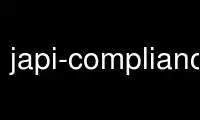
This is the command japi-compliance-checker that can be run in the OnWorks free hosting provider using one of our multiple free online workstations such as Ubuntu Online, Fedora Online, Windows online emulator or MAC OS online emulator
PROGRAM:
NAME
japi-compliance-checker - Check backward compatibility of a Java library API
DESCRIPTION
NAME:
Java API Compliance Checker (japi-compliance-checker) Check backward compatibility
of a Java library API
DESCRIPTION:
Java API Compliance Checker (Java ACC) is a tool for checking backward
binary/source compatibility of a Java library API. The tool checks classes
declarations of old and new versions and analyzes changes that may break
compatibility: removed class members, added abstract methods, etc. Breakage of the
binary compatibility may result in crashing or incorrect behavior of existing
clients built with an old version of a library if they run with a new one. Breakage
of the source compatibility may result in recompilation errors with a new library
version.
Java ACC is intended for library developers and operating system maintainers who
are interested in ensuring backward compatibility (i.e. allow old clients to run or
to be recompiled with a new version of a library).
This tool is free software: you can redistribute it and/or modify it under the
terms of the GNU LGPL or GNU GPL.
USAGE:
japi-compliance-checker [options]
EXAMPLE:
japi-compliance-checker OLD.jar NEW.jar
OR
japi-compliance-checker -lib NAME -old OLD.xml -new NEW.xml OLD.xml and NEW.xml are
XML-descriptors:
<version>
1.0
</version>
<archives>
/path1/to/JAR(s)/ /path2/to/JAR(s)/ ...
</archives>
INFORMATION OPTIONS:
-h|-help
Print this help.
-v|-version
Print version information.
-dumpversion
Print the tool version (1.4.3) and don't do anything else.
GENERAL OPTIONS:
-l|-lib|-library NAME
Library name (without version).
-d1|-old|-o PATH
Descriptor of 1st (old) library version. It may be one of the following:
1. Java ARchive (*.jar) 2. XML-descriptor (VERSION.xml file):
<version>
1.0
</version>
<archives>
/path1/to/JAR(s)/ /path2/to/JAR(s)/
...
</archives>
...
3. API dump generated by -dump option 4. Directory with Java ARchives 5. Comma
separated list of Java ARchives 6. Comma separated list of directories with Java
ARchives
If you are using 1, 4-6 descriptor types then you should specify version numbers
with -v1 and -v2 options too.
If you are using *.jar as a descriptor then the tool will try to get implementation
version from MANIFEST.MF file.
-d2|-new|-n PATH
Descriptor of 2nd (new) library version.
EXTRA OPTIONS:
-client|-app PATH
This option allows to specify the client Java ARchive that should be checked for
portability to the new library version.
-binary
Show "Binary" compatibility problems only. Generate report to
"bin_compat_report.html".
-source
Show "Source" compatibility problems only. Generate report to
"src_compat_report.html".
-v1|-version1 NUM
Specify 1st API version outside the descriptor. This option is needed if you have
prefered an alternative descriptor type (see -d1 option).
In general case you should specify it in the XML descriptor:
<version>
VERSION
</version>
-v2|-version2 NUM
Specify 2nd library version outside the descriptor.
-s|-strict
Treat all API compatibility warnings as problems.
-keep-internal
Do not skip checking of these packages:
*impl* *internal* *examples* *com.oracle* *com.sun* *COM.rsa* *sun* *sunw*
-skip-internal PATTERN
Do not check internal packages matched by the pattern.
-dump|-dump-api PATH
Dump library API to gzipped TXT format file. You can transfer it anywhere and pass
instead of the descriptor. Also it may be used for debugging the tool. Compatible
dump versions: 1.0<=V<=1.0
-classes-list PATH
This option allows to specify a file with a list of classes that should be checked,
other classes will not be checked.
-annotations-list PATH
Specifies a file with a list of annotations. The tool will check only classes
annotated by the annotations from this list. Other classes will not be checked.
-skip-deprecated
Skip analysis of deprecated methods and classes.
-skip-classes PATH
This option allows to specify a file with a list of classes that should not be
checked.
-skip-packages PATH
This option allows to specify a file with a list of packages that should not be
checked.
-short PATH
Generate short report without 'Added Methods' section.
-report-path PATH
Path to compatibility report. Default:
compat_reports/LIB_NAME/V1_to_V2/compat_report.html
-bin-report-path PATH
Path to "Binary" compatibility report. Default:
compat_reports/LIB_NAME/V1_to_V2/bin_compat_report.html
-src-report-path PATH
Path to "Source" compatibility report. Default:
compat_reports/LIB_NAME/V1_to_V2/src_compat_report.html
-quick
Quick analysis. Disabled:
- analysis of method parameter names - analysis of class field values - analysis of
usage of added abstract methods - distinction of deprecated methods and classes
-sort
Enable sorting of data in API dumps.
-show-access
Show access level of non-public methods listed in the report.
-hide-templates
Hide template parameters in the report.
-hide-packages
-minimal
Do nothing.
-show-packages
Show package names in the report.
-limit-affected LIMIT
The maximum number of affected methods listed under the description of the changed
type in the report.
OTHER OPTIONS:
-test
Run internal tests. Create two incompatible versions of a sample library and run
the tool to check them for compatibility. This option allows to check if the tool
works correctly in the current environment.
-debug
Debugging mode. Print debug info on the screen. Save intermediate analysis stages
in the debug directory:
debug/LIB_NAME/VER/
Also consider using -dump option for debugging the tool.
-title NAME
Change library name in the report title to NAME. By default will be displayed a
name specified by -l option.
-jdk-path PATH
Path to the JDK install tree (e.g. /usr/lib/jvm/java-7-openjdk-amd64).
REPORT:
Compatibility report will be generated to:
compat_reports/LIB_NAME/V1_to_V2/compat_report.html
EXIT CODES:
0 - Compatible. The tool has run without any errors. non-zero - Incompatible or
the tool has run with errors.
MORE INFORMATION:
http://ispras.linuxbase.org/index.php/Java_API_Compliance_Checker
https://github.com/lvc/japi-compliance-checker
Use japi-compliance-checker online using onworks.net services
